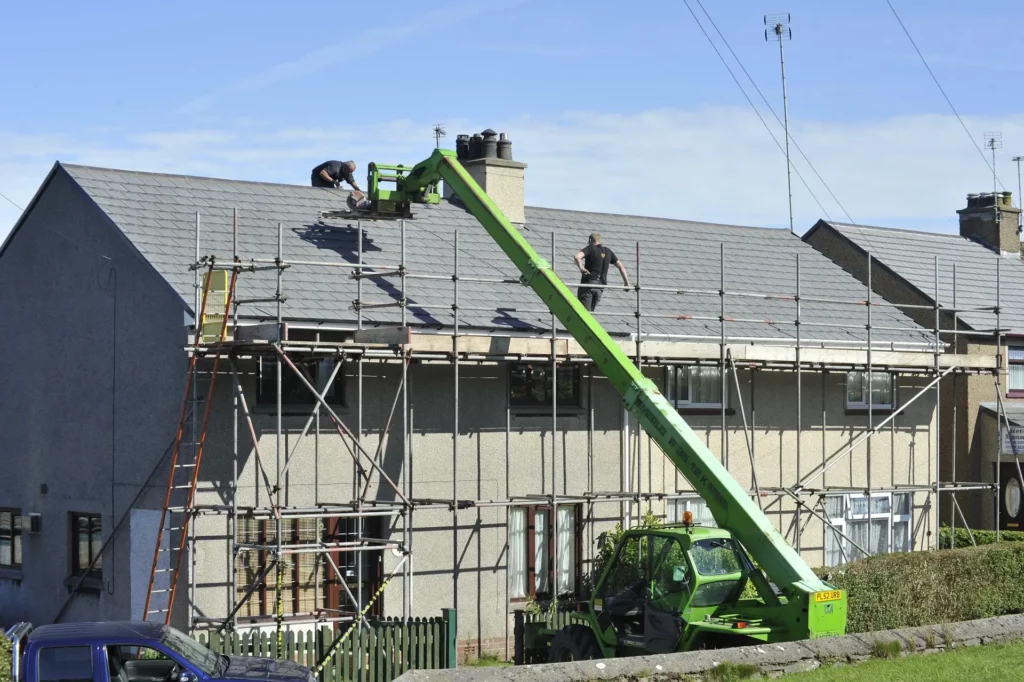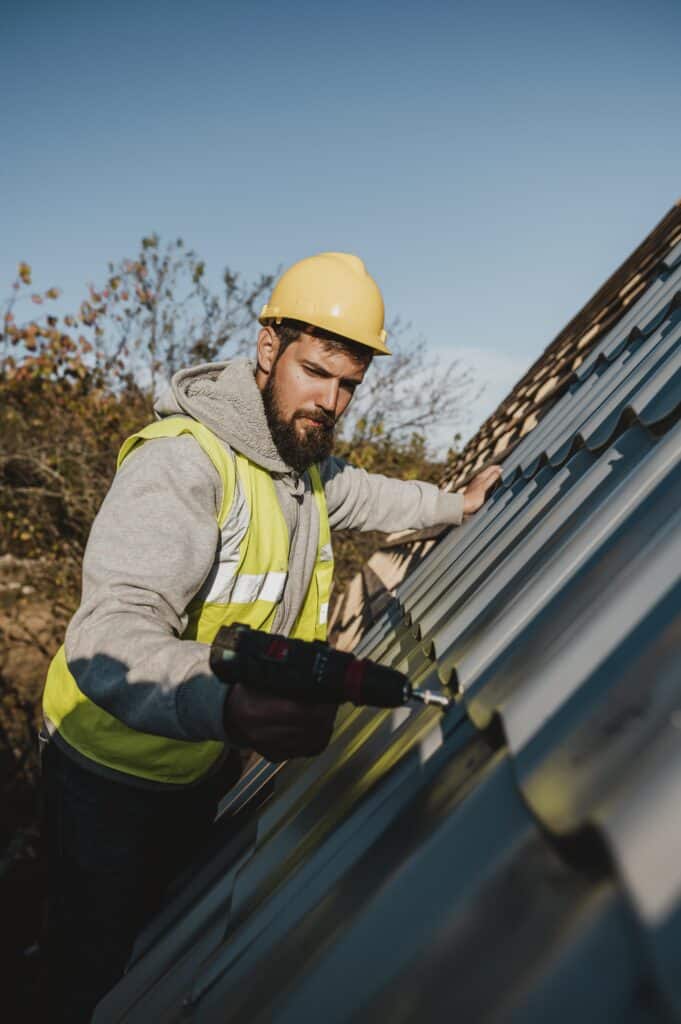South Florida roofs work harder than most—salt air, sun, daily downpours, and hurricane-season winds push every material to its limit. When something goes wrong, the big question follows: repair or replace? The best answer isn’t about price tags alone—it’s about age, extent of damage, code triggers, storm resilience, warranties, and insurance. This guide walks you through a clear, Florida-specific decision framework so you can protect your home with confidence (and fewer surprises).

First, read your roof: what condition is it really in?
Routine self-checks and semiannual professional inspections catch problems early. Look for cracked, curled or missing shingles; deteriorated flashing; piles of granules in gutters; interior stains or peeling paint—all classic warning signs your roof needs attention.
Quick triage
- Likely repair: One small leak, a few damaged shingles or localized flashing issues; deck feels solid; no recurring stains.
- Likely replacement: Multiple or recurring leaks, widespread granule loss, curled/cupped shingles, sagging areas, moisture in the attic, or damage spread across slopes. (Widespread granule loss exposes asphalt to UV and accelerates failure.)
Tip: After any strong storm, photograph your roof and ceilings and schedule a licensed inspection. Documented conditions help with both warranty and insurance conversations.
Age & material: how far along the clock are you?
Different materials have different lifespans. Asphalt shingles typically need attention far earlier than metal or tile; by the time you see systemic issues on a 20-year-old shingle roof, replacement often restores reliability better than patchwork. (Widespread granule loss and curling are late-stage indicators.)
Rule of thumb:
- Newer roof with isolated damage → prioritize targeted repairs.
- Aging roof with repeated issues → lean toward replacement for long-term protection.
When you remove and replace a roof covering in Florida, you don’t just swap shingles—you trigger updated code requirements that meaningfully improve protection. Under the 2023 Florida Building Code (8th Edition), reroofing requires a secondary water barrier (among other details), which dramatically reduces water intrusion when wind lifts coverings.
Beyond minimum code, the IBHS FORTIFIED Roof™ standard (recognized by many insurers) adds three game-changers:
- Enhanced roof-deck attachment (e.g., 8d ring-shank nails in tighter patterns),
- Sealed roof deck (so rain can’t flood your attic even if coverings blow off), and
- Locked-down roof edges (stronger drip edge and fastening to stop peel-back starting at the perimeter).
IBHS testing shows ring-shank upgrades can double uplift resistance and sealing the deck can cut water intrusion up to 95% if coverings are lost.
Why this matters to your decision:
If your roof is nearing end-of-life—or shows systemic issues—replacing lets you unlock code-required secondary water barriers and optional FORTIFIED upgrades (deck re-nailing, sealed seams, fortified edges) that a simple spot repair can’t deliver. That’s a step-change in hurricane performance, not just a cosmetic reset.

Insurance basics that influence “repair vs replace”
After wind or hail, your policy and documentation often decide what’s feasible:
- ACV vs. RCV:
- ACV (Actual Cash Value) pays depreciated value; RCV (Replacement Cost Value) covers the cost to restore to pre-loss condition (subject to terms/deductible).
- Scope matters: Insurers typically pay to address disaster-related damage; they won’t fund unrelated upgrades—unless required by code in a permitted reroof. Clear, professional inspection reports help align scope.
Pro move: Have your roofing contractor meet the adjuster onsite. Proper documentation of deck condition, fastener patterns, ridge/edge details, and underlayment damage often clarifies whether a durable repair will suffice—or whether replacement is the only way to meet code and restore function.
A simple decision framework for South Florida homes
Choose repair when:
- Damage is localized (a few shingles, one flashing point, one slope).
- Decking is dry and sound; no soft spots or sagging.
- Granule loss is minor and confined.
- Roof is well within its expected service life.
Choose replacement when:
- You have repeated leaks or leaks on multiple slopes.
- There’s widespread granule loss/curling or visible deck movement/sag.
- Fasteners/back-nailing patterns from prior installs are inadequate (common on older roofs). Upgrading allows ring-shank re-nailing and sealed deck—big resilience gains in hurricanes.
- You want modern storm features (secondary water barrier, locked edges, sealed seams) now required/encouraged when reroofing.
What a thorough Florida roof inspection should include (before you decide)
Ask your roofer to document, with photos:
- Covering condition – missing/creased shingles or cracked tiles; hail spatter; UV burn; lifted edges.
- Flashing & penetrations – step flashing, chimneys, wall interfaces, roof-to-wall kick-out flashing, vent hoods.
- Deck integrity – soft spots, prior patches, fastener withdrawal; confirm nailing patterns if sections are opened. (High-wind areas now expect tighter patterns and stronger nails.)
- Underlayment & secondary water barrier – condition and continuity; opportunities to add peel-and-stick or deck tape/sealants at seams in a reroof.
- Edges – drip edge continuity, starter alignment, and perimeter fastening (common starting point of wind failure).
- Attic/soffit ventilation – intake/exhaust balance, blocked soffits, or failed vents (FORTIFIED now tightens performance expectations for vents to resist wind-driven rain).
- Interior signs – ceiling stains, peeling paint, musty odors indicating long-term moisture.
Why replacement can be a resilience “reset” in hurricane country
A permitted reroof in Florida activates requirements and opportunities that repairs can’t fully capture:
- Secondary water barrier: Now referenced in the 2023 FBC during reroof—critical in wind-driven rain.
- Enhanced decking attachment: Re-nailing with 8d ring-shanks (and tighter spacing) dramatically increases uplift capacity—twice that of smooth nails in testing.
- Sealed roof deck: Tape or membrane over sheathing seams prevents attic flooding if coverings peel; IBHS shows up to 95% less water intrusion.
- Fortified edges: Stronger drip edge details reduce the most common initiation point of wind failure.
These upgrades translate into fewer emergency tarps after storms, drier interiors, and roofs that last closer to their intended life—even in South Florida’s climate.
FAQ: smart homeowner questions (without getting salesy)
Will a repair void or affect my shingle warranty?
Possibly. Many manufacturers require specific underlayment, ventilation, and fastening details—even for small repairs. Ask your roofer to document materials and methods to maintain coverage.
Does an older roof automatically mean replacement?
Not automatically. If damage is minor and the deck is sound, a targeted repair can buy time. But repeated issues on an aging roof often signal deeper system failure; replacing restores waterproofing, wind resistance, and warranty protection at once.
How do ACV and RCV policies affect my options?
Under ACV, payouts reflect depreciation; RCV aims to cover what it takes to restore to pre-loss condition (subject to policy terms). Understanding your coverage early helps set realistic expectations about repair vs. replacement.
If FEMA is involved after a disaster, will they pay for a full reroof?
Generally, assistance focuses on repairing disaster-related damage to restore habitability, not upgrading undamaged portions—unless code requires elements as part of permitted work. Documentation from local officials and your contractor is essential.
Bottom line for South Florida homes
- Repair is appropriate for localized, one-off problems on otherwise healthy roofs.
- Replacement makes sense when aging + widespread damage meet the opportunity to harden the system—adding a secondary water barrier, ring-shank re-nailing, sealed seams, and locked edges per Florida code and FORTIFIED best practices.
If you’re on the fence, ask for a photo-documented inspection and a side-by-side plan: what a durable repair entails (materials, details, expected life) vs. what a compliant reroof unlocks (secondary barrier, sealed deck, improved nailing, edge upgrades, and warranties). That comparison—grounded in code and science, not guesswork—will usually make the right choice obvious.